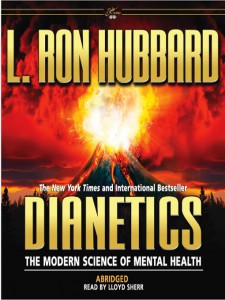Inside Scientology: Visiting the Church and Reading Dianetics

Magma streams like rivers down the gape of an erupting volcano. It could symbolize the Roman god Vulcan, forging the pillars of the Earth. It could be Pele, the Hawaiian god of death and rebirth. Maybe it’s just a damn volcano, but on the cover of Dianetics, the official text of Scientology, it reminds me of that South Park episode where an alien snatched and blew everyone up with an atom bomb in a giant volcano.
“That’s not true,” a Scientologist named Mark said. “We’ve never said that.”
Mark talks to people who come looking for answers at the Church of Scientology in Washington, D.C. They get a lot of people asking about Xenu, the lord of the Galactic Confederacy. They deny it emphatically.
An ad in the newspaper brought me there. Religion in Youngstown is mainstream and traditional. There’s a mosque and a synagogue, but most everyone is some sort of Christian—even Mormon. To me, it was like going to a zoo or museum where they keep strange and rare belief systems on display.
Mark showed me around and led me to a station where I watched some informational videos. After three of those, I felt I knew even less about Scientology. I asked about God, good and evil, and ultimate truth.
“It’s whatever you want it to be,” he said.
I explained that the word “ultimate” meant it had to exist apart from my own opinion. Allah isn’t the same as Buddha or Zeus. Words like “right” and “wrong” need to be defined. “How does Scientology do that?”
Based on Mark’s response, they really try not to. You can believe in whatever god and still study Scientology. You can ascribe to whatever morality you choose, so long as you are not involved in any illegal activity.
These are the questions religion usually answers. Why should I join one if I have to figure that out on my own?
“We can help you live a better life,” he said.
He told me that for any problem I may have, they sell a product (described like a seminar) that could help me evaluate my mind’s processes and teach me to fix them. I asked more questions, but for every “why” and “how,” he led me to another wall of stuff to buy.
Sensing my frustration, he presented me with a copy of Dianetics. “This will answer most of the basic questions you have.”
Answers don’t come cheap from the Church of Scientology. It was shadier than a drug deal. I left empty-handed on principle. I didn’t want to give them my money.
Luckily, the AHA had a copy. It is 500 pages of dense and confusing language. I was sorry about half way through.
L. Ron Hubbard, who wrote Dianetics more than 60 years ago, used a lot of words that could lead someone to believe it is a science book: experiment, lab, data. He wrote that the concepts within have been tested and proven, but there is no evidence to support that any experiments were made. And that’s important considering the book claims schizophrenia, myopia, and even the common cold can all be cured by the study of this pseudoscience.
The book revolves around engrams. They are, supposedly, harmful memories that manifest in behavior. Abuse or other traumatic events may imprint engrams on the mind, but even something as trivial as a paper cut could have serious consequences for your physical and mental health. These negative impressions are unconscious. We can’t just decide not to behave a certain way. We need to study Dianetics to become Clear (capital C), Hubbard’s perfect person who is free from these disease causing demons.
I went back to ask Mark about the things I read. He wasn’t any more helpful than before. Questions were met with run-arounds and sales pitches. I pressed harder, but he didn’t like my critical tone. I wasn’t asked to leave, but it was obvious I wasn’t welcome.
The Church of Scientology boasts millions of members in dozens of countries. People are so hungry for meaning and a better life that they believe all kinds of things to help fill the void. Some believe that invisible parasites effectively control their behavior, but is that any more laughable than a man who was executed and resurrected 2,000 years ago for the sins of humankind?
I wonder why I am the exception to the rule. Most people live 70, 80, 90 years accepting whatever their parents told them about God and life after death. Why didn’t I remain content with the fairytales of my youth? I’m not exceptionally intelligent. I’m not overly courageous. I’m not looking for an excuse to be immoral. I’m just trying to piece together an accurate view of the universe and my place in it—as much as I can, at least.
The downside, of course, is that my life only has the meaning I assign to it. I’ve accepted that fact. I’ve even come to be glad for it. I am literally the most important person in the world. But most people aren’t ready for that way of life. They’ll probably always look to institutions that claim to have solved the puzzle. And so long as people are willing to pay, the claims will only multiply.
